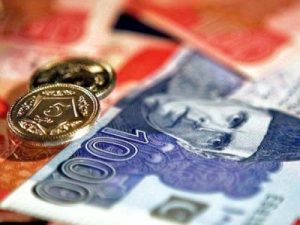The mini-budget is expected to be brought about by presidential ordinance.
The government intends to charge a flood fee on imports in order to raise an additional Rs60 billion.

ISLAMABAD: Although the government postponed a decision on Thursday to impose a windfall income tax on commercial banks as retaliation for currency manipulation, it may publish a Presidential Ordinance to impose a flood levy on imports in order to raise an additional Rs60 billion in taxes.
According to sources in the Ministry of Finance, it has been determined in principle to apply 1% to 3% import tariffs in order to generate an additional Rs60 billion in income.
The money would remain outside the federal divisible pool and would not be dispersed in accordance with the National Finance Commission Award if these obligations were imposed as a levy, nevertheless.
The charge would not be included in the Federal Board of Revenue’s collection because it is not a tax.
The first draught of the Presidential Ordinance has reportedly been created and is awaiting approval from the federal cabinet and the inauguration of the president, according to the sources. The ordinance can start to be followed on Sunday.
They said that it might take extra time if the government decides to include the windfall income tax on commercial banks in the ordinance.
If the government takes sufficient steps to close the revenue gap, the ordinance’s adoption may also help the government’s case in the eyes of the International Monetary Fund.
According to the sources, a 1% to 3% flood fee on imports could be implemented to bring in Rs60 billion.
The 1% rate may be applied to imported items that are currency exempt, with the exception of those that are excluded under the Vienna Convention or the 5th Schedule of the Customs Act.
The 2% surcharge may be applied to products that do not qualify as luxury goods.
They stated that a 3% fee might be applied to expensive items.
To make up for the Rs100 billion shortfall in the annual aim for collecting customs charges, the original plan called for the imposition of up to 3% more in customs duties.
In the current fiscal year, the government may fall short of its objective of collecting Rs1.150 trillion in customs duties by more than Rs100 billion.
The value of imports from July to mid-December was $29 billion. However, around $12 billion, or 41% of imports, were duty-free. The imports have decreased by 22% thus far, which is hurting revenue.
During the first four months of the current fiscal year, the share of import taxes fell to 45% from roughly 52% in the previous fiscal year.
The government has calculated that the slowdown in economic activity will have a negative impact of Rs380 billion on its yearly target of Rs7.470 trillion. The FBR’s ability to collect income has also begun to suffer as a result of the legal battles.
Due to these delicate issues, the FBR was unable to make a decision about the commercial banks’ windfall income tax on Thursday. Only the commercial banks’ portion of foreign exchange income is planned to be subject to the levy.
According to government sources, the State Bank of Pakistan has concluded an investigation into commercial banks and established currency manipulation during the quarter from April to June 2022. The SBP would get any money the central bank collected, as it may not be able to apply severe fines.
According to the sources, the government intends to use the windfall tax to reclaim the additional profits produced by the banks.
Due to the lack of reliable information regarding the net gains these banks gained on the amount of additional currency transactions, a decision could not be made on Thursday.
The issue will now be reevaluated, and if the tax authorities have a strong foundation to decide the legality of the windfall earnings, the tax can be included in the ordinance.
The overall revenue from foreign exchange earnings received by all commercial banks in 2022 is predicted to be between Rs100 and Rs110 billion.
How much of it was caused by currency manipulation must be determined by the FBR. The windfall tax rate might be as high as 40% of the banks’ portion of foreign exchange earnings.
In 2023, the banks will pay 49% income tax, including 10% super tax, excluding the windfall tax.
The rate could be lower than 40% if the FBR permits the banks to remove expenses from the portion of foreign currency earnings.
Despite the 3.5% total economic growth in 2021, the banking industry saw exceptional growth. Bank advances expanded unusually well by 23.4% while total deposits increased by 17.7%, at least in part as a result of recently implemented regulations that penalise unfavourable advances-to-deposit (ADR) ratios at higher rates.
The government’s withdrawal of the Rs15,000 and Rs7,500 bearer prize bonds and a 17.7% increase in deposits were the main sources of funding for the total growth in banking assets.
The banking sector’s overall profit before taxes increased from Rs417 billion in 2020 to Rs470 billion in 2021, a 12.6% increase.
As the FBR prepares to take on the enormous task of collecting Rs965 billion in December, these solutions are being examined. This goal is much greater than the June 2023 goal, which was established under the presumption that the FBR would earn about Rs 260 billion in December from budgetary taxes.
The government has set a tax target of Rs3.65 trillion for the first half (July-December) of FY2022-23.
Last week, the Sindh High Court (SHC) repealed a 10% super tax, calling it “discriminatory” and “ultra vires the Constitution.” This action would cost the government Rs247 billion in revenue and has also brought attention to how poorly the tax system functions.
However, the FBR continues to collect the tax from businesses that have not file a legal challenge to the charge.










































